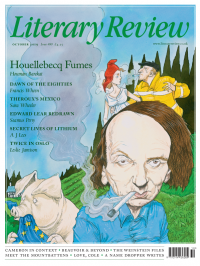Michael Goldfarb
People of Many Books
Genius & Anxiety: How Jews Changed the World, 1847–1947
By Norman Lebrecht
Oneworld 442pp £20
As he approached his ninetieth birthday, the historian Eric Hobsbawm published an essay revealing the one historical question he still wanted to explore: ‘After many centuries during which the intellectual and cultural history of the world … could be written with little reference to the contribution of any Jews, we almost immediately enter the modern era, where Jewish names are disproportionately represented.’
‘Disproportionately’ is the perfect word. Hobsbawm dated the ‘modern era’ to the turn of the 19th century, when, in the wake of the French Revolution and Napoleonic conquests, the enforced ghettoisation of European Jewry came to an end. In the ensuing 150 years, the Jews of Europe burst into all sections of life. Jews formed barely 2 per cent of Europe’s population, but Jewish thinkers such as Karl Marx, Sigmund Freud and Albert Einstein and artists such as Gustav Mahler, Marcel Proust and Franz Kafka completely reshaped European (not to mention American) identity.
The subtitle of Norman Lebrecht’s book, ‘How Jews Changed the World’, underlines the importance of this story. But you will not come away from reading it with any deep understanding of the connection between genius and anxiety, or of the ways in which it gave this minority the energy to

Sign Up to our newsletter
Receive free articles, highlights from the archive, news, details of prizes, and much more.@Lit_Review
Follow Literary Review on Twitter
Twitter Feed
It wasn’t until 1825 that Pepys’s diary became available for the first time. How it was eventually decrypted and published is a story of subterfuge and duplicity.
Kate Loveman tells the tale.
Kate Loveman - Publishing Pepys
Kate Loveman: Publishing Pepys
literaryreview.co.uk
Arthur Christopher Benson was a pillar of the Edwardian establishment. He was supremely well connected. As his newly published diaries reveal, he was also riotously indiscreet.
Piers Brendon compares Benson’s journals to others from the 20th century.
Piers Brendon - Land of Dopes & Tories
Piers Brendon: Land of Dopes & Tories - The Benson Diaries: Selections from the Diary of Arthur Christopher Benson by Eamon Duffy & Ronald Hyam (edd)
literaryreview.co.uk
Of the siblings Gwen and Augustus John, it is Augustus who has commanded most attention from collectors and connoisseurs.
Was he really the finer artist, asks Tanya Harrod, or is it time Gwen emerged from her brother’s shadow?
Tanya Harrod - Cut from the Same Canvas
Tanya Harrod: Cut from the Same Canvas - Artists, Siblings, Visionaries: The Lives and Loves of Gwen and Augustus John by Judith Mackrell
literaryreview.co.uk